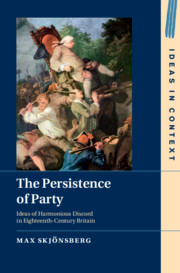2 results
Chapter 2 - Rapin on the Origins and Nature of Party Division in Britain
-
- Book:
- The Persistence of Party
- Published online:
- 27 January 2021
- Print publication:
- 28 January 2021, pp 40-76
-
- Chapter
- Export citation

The Persistence of Party
- Ideas of Harmonious Discord in Eighteenth-Century Britain
-
- Published online:
- 27 January 2021
- Print publication:
- 28 January 2021

